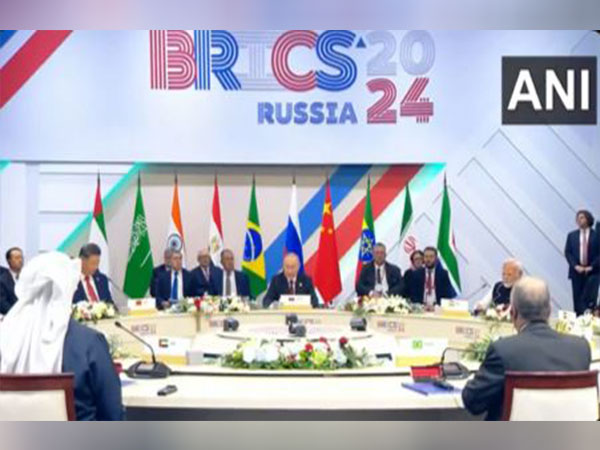New Delhi: Indian Prime Minister Shri Narendra Modi’s participation in the 16th BRICS Summit in Kazan has opened a new era of global peace and prosperity.
The summit brought together leaders from Brazil, Russia, India, China, South Africa, Ethiopia, Iran, Egypt, and the UAEheld under the theme: ‘‘Strengthening Multilateralism for Just Global Development and Security’’.
During the summit, the Indian Prime Minister addressed two sessions, emphasizing that the gathering occurs amidst numerous global uncertainties and challenges, such as conflicts, adverse climate effects, and cyber threats.
India asserted the necessity for heightened expectations from BRICS and advocated for a people-centric approach to effectively address these issues. Furthermore, stressed the importance of the prompt adoption of a Comprehensive Convention on International Terrorism at the United Nations to combat the threat of terrorism. India also urged BRICS to take an active role in advocating for reforms in global governance.
The coalition, originally known as "BRIC," was established in 2006 by Brazil, Russia, India, and China. The leaders of BRIC (Brazil, Russia, India, and China) countries met for the first time in St. Petersburg, Russia, on the margins of G8 Outreach Summit in July 2006.
Shortly afterwards, in September 2006, the group was formalised as BRIC during the 1st BRIC Foreign Ministers’ Meeting, which met on the sidelines of the General Debate of the UN Assembly in New York City. After a series of high level meetings, the 1st BRIC summit was held in Yekaterinburg, Russia on 16 June 2009.
It was subsequently renamed BRICS following the acceptance of South Africa as a full member during the BRIC Foreign Ministers’ meeting in New York in September 2010. As a result, South Africa attended the 3rd BRICS Summit in Sanya, China, on April 14, 2011.
This partnership aims to consolidate the influence of key developing countries and provide a counterbalance to Western powers in global governance. The BRICS group, will now expand to include four new members—Egypt, Ethiopia, Iran, and the UAE. So total membership of BRICS currently comprises nine nations: Brazil, Russia, India, China, South Africa, Ethiopia, Iran, Egypt, and the UAE.
BRICS countries have been the main engines of global economic growth over the years accounting for about 45% of the World's population and nearly 26% of the global GDP. India and China are among the top 10 leading economies in the World, and both countries are the first and second largest economies among the BRICS countries.
China share in global GDP accounts for 16.8% followed by India (3.4%), Brazil (2.1%), Russia (1.9%), United Arab Emirates (0.5%), Egypt (0.4%), Islamic Republic of Iran (0.4%),South Africa (0.4%) and Ethiopia (0.2%).
Over a period of time, BRICS countries have come together to deliberate on important issues under the three pillars of political and security, economic and financial and cultural and people to people exchanges.With the inclusion of Ethiopia, Iran, Egypt, and the UAE, BRICS nations collectively contribute around 30% of global crude oil production.
During the summit, Modi engaged in discussions with Xi Jinping, President of the People's Republic of China. The two leaders agreed that the Special Representatives on the India-China boundary question would meet at an early date to oversee the management of peace & tranquility in border areas and to explore a fair, reasonable, and mutually acceptable solution to the boundary question.
The two leaders affirmed that stable, predictable, and amicable bilateral relations between India and China, as two neighbors and the two largest nations on earth, will have a positive impact on regional and global peace and prosperity. It will also contribute to a multipolar Asia and a multipolar world.
Modi also met with the President of the Russian Federation, H.E. Vladimir Putin. The two leaders also reviewed bilateral cooperation in a range of fields, including political, economic, defence, energy, and people-to-people ties. The two leaders agreed to remain engaged to further strengthen the Special and Privileged Strategic Partnership between the two countries, which continues to register significant growth and has shown resilience in the backdrop of geopolitical uncertainties.
Modi also held a bilateral meeting with H.E. Dr. Masoud Pezeshkian, President of the Islamic Republic of Iran. They recognized the signing of the long-term contract for Chabahar Port as a significant achievement in their bilateral ties.
The leaders highlighted its crucial role in the reconstruction and redevelopment of Afghanistan and in fostering trade and economic relations with Central Asia. Additionally, they reviewed the status of their bilateral relations and deliberated on strategies to bolster cooperation in various domains.
In conclusion, the 16th BRICS Summit held in Kazan served as a significant platform for fostering collaboration among emerging economies amidst pressing global challenges. At the conclusion of the Summit, the leaders adopted the ‘Kazan Declaration’.India’semphasis on multilateralism and a people-centric approach highlights the urgent need for collective action to address issues such as terrorism, climate change, and economic inequality.
The expansion of BRICS to include new members strengthens the coalition's influence in global governance and economic matters. As the leaders adopted the Kazan Declaration, their commitments to enhance cooperation in various sectors signify a united front aimed at promoting stability and prosperity in an increasingly multipolar world. The summit not only reinforced existing partnerships but also laid the groundwork for a more integrated future among the BRICS nations, presenting a beacon of hope for equitable global development.
